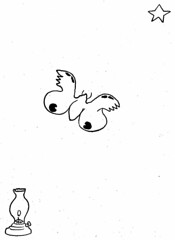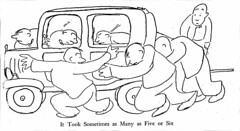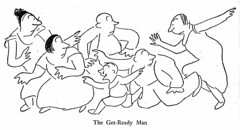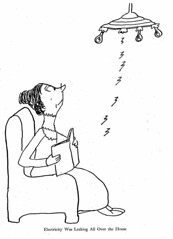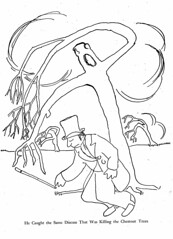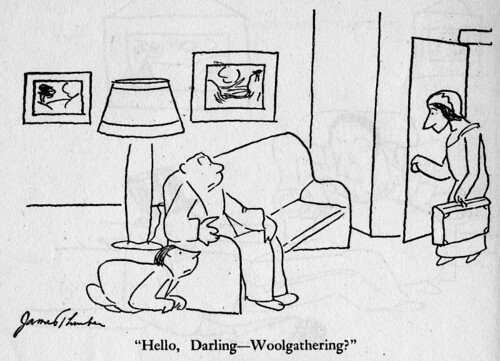by John Lennon, 1965
I find it recornered in my nosebook that it was a dokey and winnie dave towart the end of Marge in the ear of our Loaf 1892 in Much Bladder, a city off the North Wold. Shamrock Womlbs had receeded a telephart whilst we sat at our lunch eating. He made no remark but the matter ran down his head, for he stud in front of the fire with a thoughtfowl face, smirking his pile, and casting an occasional gland at the massage. Quite sydney without warping he turd upod me with a miscarriage twinkle in his isle.
'Ellifitzgerrald my dear Whopper,' he grimmond then sharply 'Guess whom has broken out of jail Whopper?' My mind immediately recoughed all the caramels that had recently escaped or escaped from Wormy Scabs.
'Eric Morley?' I ventured. He shook his bed. 'Oxo Whitney?' I queered, he knotted in the infirmary. 'Rygo Hargraves?' I winston agreably.
'No, my dear Whopper, it's OXO WHITNEY' he bellowed as if I was in another room, and I wasn't.
'How d'you know Womlbs? ' I whispered excretely.
'Harrybellafonte, my dear Whopper.' At that precise morman a tall rather angularce tall thin man knocked on the door. 'By all accounts that must be he, Whopper.' I marvelled at his acute osbert lancaster.
'How on urge do you know Womlbs' f asped, revealing my bad armchair.
'Eliphantitus my deaf Whopper' he baggage knocking out his pip on his large leather leg. In warped the favourite Oxo Whitney none the worse for worms.
'I'm an escaped primrose Mr Womlbs' he grate darting franetically about the room.
'Calm down Mr Whitney! ' I interpolled 'or you'll have a nervous breadvan.'
'You must be Doctored Whopper' he pharted. My friend was starving at Whitney with a strange hook on his eager face, that tightening of the lips, that quiver of the nostriches and constapation of the heavy tufted brows which I knew so well.
'Gorra ciggie Oxo' said Womlbs quickly. I looked at my colledge, hoping for some clue as to the reason for this sodden outboard, he gave me no sign except a slight movement of his good leg as he kicked Oxo Whitney to the floor. 'Gorra ciggie Oxo' he reapeted almouth hysterically.
'What on urn are you doing my dear Womlbs' I imply; 'nay I besiege you, stop lest you do this poor wretch an injury! '
'Shut yer face yer blubbering owld get' screamed Womlbs like a man fermented, and laid into Mr Whitney something powerful wat. This wasn't not the Shamrock Womlbs I used to nose, I thought puzzled and hearn at this suddy change in my
old friend.
Mary Atkins pruned herselves in the mirage, running her hand wantanly through her large blond hair. Her tight dress was cut low revealingly three or four blackheads, carefully scrubbed on her chess. She addled the final touches to her makeup and fixed her teeth firmly in her head. 'He's going to want me tonight' she thought and pictured his hamsome black curly face and jaundice. She looked at her clocks impatiently and went to the window, then leapt into her favorite armchurch, picking up the paper she glassed at the headlines. 'MORE NEGOES IN THE CONGO' it read, and there was, but it was the Stop Press which corked her eye. 'JACK THE NIPPLE STRIKE AGAIN.' She went cold all over, it was Sydnees and he'd left the door open.
'Hello lover' he said slapping her on the butter.
'Oh you did give me a start Sydnees' she shrieked laughing arf arfily.
'I always do my love' he replied jumping on all fours. She joined him and they galloffed quickly downstairs into a harrased cab. 'Follow that calf' yelped Sydnees pointing a rude fingure.
'White hole mate! ' said the scabbie.
'Why are we bellowing that card Sydnees? ' inquired Mary fashionably.
'He might know where the party' explained Sydnees.
'Oh I see' said Mary looking up at him as if to say.
The journey parssed pleasantly enough with Sydnees and Mary pointing out places of interest to the scab driver; such as Buckinghell Parcel, the Horses of Parliamint, the Chasing of the Guards. One place of particularge interest was the Statue of Eric in Picanniny Surplass.
'They say that if you stand there long enough you'll meet a friend' said Sydnees knowingly, 'that's if your not run over.'
'God Save the Queens' shouted the scabbie as they passed the Parcel for maybe the fourth time.
'Jack the Nipple' said Womlbs puffing deeply on his wife, 'is not only a vicious murderer but a sex meany of the lowest orgy.' Then my steamed collic relit his pig and walkered to the windy of his famous flat in Bugger St in London where it all happened. I pondled on his statemouth for a mormon then turding sharply I said. 'But how do you know Womlbs? '
'Alibabba my dead Whopper, I have seen the film' I knew him toby right for I had only read the comic.
That evenig we had an unexpeckled visitor, Inspectre Basil, I knew him by his tell-tale unicorn.
'Ah Inspectre Basil mon cher amie' said Womlbs spotting him at once. 'What brings you to our humble rich establishment?'
'I come on behave of thousands' the Inspectre said sitting quietly on his operation.
'I feel l know why you are here Basil' said Womlbs eyeing he leg. 'It's about Jock the Cripple is it not?' The Jnspectre smiled smiling.
'How did you guess? ' I inquired all puzzle.
'Alecguiness my deep Whopper, the mud on the Inspectre's left, and also the buttock on his waistbox is misting.'
The Inspectre looked astoundagast and fidgeted nervously from one fat to the other. 'You neville sieze to amass me Mr Womlbs.'
'A drink genitalmen' I ventured, 'before we get down to the businose in hand in hand?' They both knotted in egremont and I went to the cocky cabinet. 'What would you prepare Basil, Bordom '83 or? '
'I'd rather have rather have rather' said the Inspectre who was a gourmless. After a drink and a few sam leeches Womlbs got up and paced the floor up and down up and down pacing.
'Why are you pacing the floor up and down up and down pacing dear Womlbs' I inquiet.
'I'm thinking alowed my deaf Whopper.' I looked over at the Inspectre and knew that he couldn't hear him either.
'Guess who's out of jail Mr Womlbs' the Inspectre said subbenly. Womlbs looked at me knowingly.
'Eric Morley?' I asked, they shook their heaths. 'Oxo Whitney?' I quart, again they shoot their heaps. 'Rygo Hargraves?' I wimpied.
'No my dear Whopper, OXO WHITNEY!' shouted Womlbs leaping to his foot. I loked at him admiring this great man all the morphia.
Meanwire in a ghasly lit street in Chelthea, a darkly clocked man with a fearful weapon, creeped about serging for revenge on the women of the streets for giving him the dreadfoot V.D. (Valentine Dyall). 'I'll kill them all womb by womb' he muffled between scenes. He was like a black shadow or negro on that dumb foggy night as he furtively looked for his neck victim. His minds wandered back to his childhook, remembering a vague thing or two like his mother and farmer and how they had beaten him for eating his sister. 'I'm demented' he said checking his dictionary, 'I should bean at home on a knife like these.' He turned into a dim darky and spotted a light.
Mary Atkins pruned herselves in the mirrage running her hand wantanly through her large blond hair. Her tight dress was cut low revealingly three or four more blackheads carefully scrubbed on her chess. Business had been bad lately and what with the cost of limping. She hurriedly tucked in her gooseberries and opened the door. 'No wonder business is bad' she remarked as she caught size of her hump in the hall mirror. 'My warts are showing.' With a carefree yodel she slept into the street and caught a cab to her happy humping grounds. 'That Sydnees's nothing but a pimple living on me thus' she thought 'lazing about day in day off, and here's me plowing my train up and down like Soft Arthur and you know how soft Arthur.' She got off as uterus at Nats Cafe and took up her position.
'They'll never even see me in this fog' she muttered switching on her lamps. Just then a blasted Policemat walked by. 'Blasted Policemat' she shouted, but luckily he was deaf. 'Blasted deaf Policemat' she shouted. 'Why don't yer gerra job!'
Little did she gnome that the infamous Jack the Nipple was only a few streets away. 'I hope that blasted Jack the Nipple isn't only a few streets away,' she said, 'he's not right in the heads.'
'How much lady' a voice shocked her from the doorways of Nats. Lucky for him there was a sale on so. they soon retched an agreament. A very high class genderman she thought as they walked quickly together down the now famous Carringto Average.
'I tell yer she whore a good woman Mr Womlbs sir' said Sydnees Aspinall.
'I quite believe you Mr Asterpoll, after all you knew her better than me and dear old buddy friend Whopper, but we are not here to discuss her merits good or otherwives, we are here, Mr Asronaute, to discover as much information as we can about the unfortunate and untidy death of Mary Atkins.' Womlbs looked the man in the face effortlessly.
'The name's Aspinall guvnor' said the wretched man.
'I'm deleware of your name Mr Astracan.' Womlbs said looking as if he was going to smash him.
'Well as long as you know,' said Aspinall wishing he'd gone to Safely Safely Sunday Trip. Womlbs took down the entrails from Aspinall as quickly as he could, I could see that they weren't on the same waveleg.
'The thing that puddles me Womlbs,' I said when we were alone, 'is what happened to Oxo Whitney? ' Womlbs looged at me intently, I could see that great mind was thinking as his tufted eyepencil knit toboggen, his strong jew jutted out, his nosepack flared, and the limes on his furheads wrinkled.
'That's a question Whopper.' he said and I marveled at his grammer. Next day Womlbs was up at the crack of dorchester, he didn't evening look at the moaning papers. As yewtree I fixed his breakfat of bogard, a gottle of geer, a slice of jewish bread, three eggs with little liars on, two rashes of bacon, a bowel of Rice Krustchovs, a fresh grapeful, mushrudes, some freed tomorrows, a basket of fruits, and a cup of teens.
'Breakfeet are ready' I showbody 'It's on the table.' But to my supplies he'd already gone. 'Blast the wicker basket yer grannie sleeps in.' I thought 'Only kidding Shamrock' I said remembering his habit of hiding in the cupboard.
That day was an anxious one for me as I waited for news of my dear friend, I became fretful and couldn't finish my Kennomeat, it wasn't like Shamrock to leave me here all by my own, lonely; without him I was at large. I rang up a few close itamate friends but they didn't know either, even Inspectre Basil didn't know, and if anybody should know, Inspectre Basil should 'cause he's a Police. I was a week lately when I saw him again and I was shocked by his apeerless, he was a dishovelled rock.
'My God Womlbs' I cried 'My God, what on earth have you been?'
'All in good time Whopper' he trousered. 'Wait till I get my breast back.'
I poked the fire and warmed his kippers, when he had mini-coopered he told me a story which to this day I can't remember.
